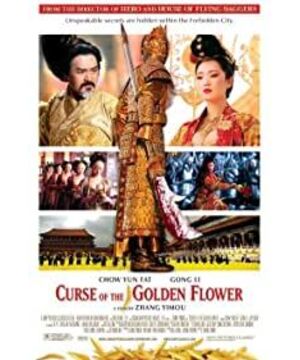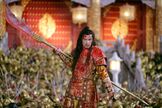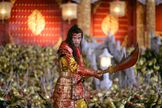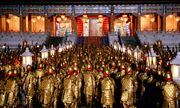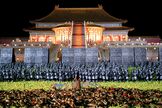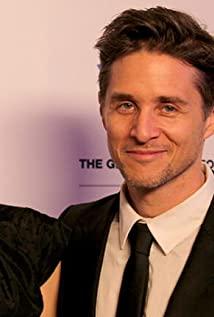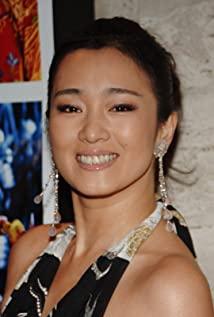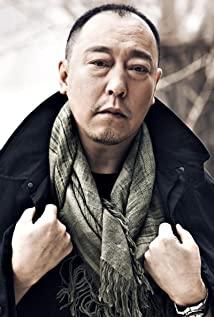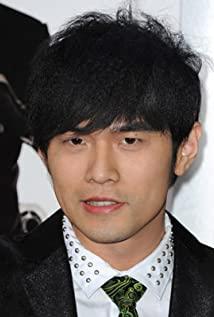-- "The Golden Armor of the City" must admit that after seeing "The Golden
Armor
of the City" (hereinafter referred to as "Golden Armor") before the national release, I think it is the best "Chinese style". Blockbuster"--"Golden Armor" is a gorgeous turn of Zhang Yimou, who was "post-hero". It continues the theme of "The Red Lanterns" and "Judou" criticizing traditional culture, and continues in the "Chinese blockbuster era" in the 21st century. It is a despairing fable about traditional Chinese political civilization; I also optimistically expected that "Golden Armor" can finally gain "the first bucket of word of mouth" for Chinese blockbusters in addition to the box office.
But I didn't expect that when "Golden Armor" was released nationwide, my colleagues almost unanimously questioned my opinion after watching it. Regardless of whether the Chinese-style blockbuster finally wins the first bucket of word of mouth, this question is more worthy of serious consideration: the so-called "fascist" aesthetic style question raised by existing scholars. This style, developed to the extreme in the glittering "Golden Armor", should be regarded as an important aesthetic feature of Chinese-style blockbusters: for example, words like "fascist" are used in the film review of "Night Banquet" (box text); "Promise" was criticized for "not a single person, not a scene of daily life or city life, not a single noise and noise, again reminiscent of Susan Sontag's analysis of Riefenstein." (Cui Wei Pingwen)
The "hero sees" in the aesthetic style of "Chinese-style blockbusters" starting from "Heroes" is a very interesting topic. The performance of large-scale group gymnastics scenes, which intentionally or unintentionally eliminates the "noise and noise" of daily scenes, is quite contemporary with Chinese characteristics, and vaguely echoes Riefenstein. Of course, "fascist aesthetics" is too sensitive and too directional. If a word "group gymnastics aesthetics" is created, it may be a fairer name.
one,
"Golden Armor", born out of "Thunderstorm", transplanted an ethical tragedy that occurred in a large feudal family in modern China into the palace harem of the late Tang, Five Dynasties and Ten Kingdoms. The creator said that he deliberately avoided the scenes of the king's dynasty, and let the whole play intentionally be confined to the narrow space of the harem. This coincides with the idea of Ning Ying's "Infinite Movement" at the beginning of the year. Ning Ying let the camera penetrate into our era like a gastroscope, trying to write the spiritual history of contemporary China in the film; Zhang Yimou let the camera Stretching into the harem of Chinese history, the sad and disgusting insides of traditional Chinese political civilization were turned out and laid out in front of us.
However, echoing the attempt to find out the inside, it is a boast of the prosperity of the world. Hypothesis is a stunt that Chinese-style blockbusters usually like to perform. In "Golden Armor", this kind of display has reached an unprecedented level, and because of this extreme, it has reached the realm of "form is content". To a certain extent, the highly recommended "enlarged breasts" has even evolved into a totem-style landscape. What echoed it was the golden chrysanthemums that neatly covered the square.
Exactly.
The basic element of "group gymnastics aesthetics" - necessary, exaggerated yet neatly brilliant.
This extremely gorgeous and extremely gorgeous appearance is so arrogantly opposed to this story of despair and coldness.
From the erotic scenes of the three thousand beauties in the front and back palaces, Zhang Yimou restored it for the first time. Boasting breasts, exaggerated costumes, glazed beams and pillars, it is more flashy than the prosperous world, but flashy adds a sense of deformity. The sizable, hard squeezed breasts look like Beardsley's morbidly beautiful illustrations; the red and green glazed pillars can also be quoted from Van Gogh's own painting "Cafe at Night" "Description: "I tried to express this concept in this painting: a hotel is a place where people can sink or go crazy or criminal. I try to use red and green as a medium to reveal the terrible lust in human nature... I What I want to present is the dark power of a low-class hotel."
This is the basic tone of the scene of the small incident in Omiya.
This is a splendid picture of a prosperous bank about to collapse.
two,
In terms of time, the design of the Five Dynasties and Ten Kingdoms coincides with that of "The Banquet". Five Dynasties and Ten Kingdoms, too chaotic historical time, this is a convenient historical background for screenwriters. But for "Night Banquet", this kind of design only facilitates the intoxication of screenwriters and technology (the scene of sticking can be regarded as a typical example of such intoxication); and in "Golden Armor", this chaos effectively weakens history Sense--Since it is not easy to associate with historical figures we know well, once there is an appropriate hint (whether intentional or not), it is easier for us to associate with any historical period. The chrysanthemums that covered the palace square, and the confrontation between the warriors in golden armor and silver armor, the uniform performance of the extras from the army even gave me the illusion of time staggering, thinking that I was back to the 40th anniversary of the National Day. Tiananmen Square and the spectacular scene of the opening ceremony of the Asian Games.
This temporal design gives The Golden Armor a hyper-historical (not surreal) sense. The emperor played by Chow Yun-fat is not only a specific emperor of a certain dynasty, but also a typical "this one" in the long history of China. And those dark stories, such as ordering the queen to drink poisoned Chinese medicine, also transcended the specific dynastic background and became a parable similar to "Diary of a Madman" seeing "cannibalism" from historical books. In this super-historical atmosphere, the criticism of traditional Chinese political civilization has gained a wider time dimension (even a sense of reality that borrows the past to satirize the present. Needless to say, contemporary China has also undertaken the 5,000-year-old civilization this part of the estate).
Third,
finally came to the most complicated part of "group gymnastics aesthetics".
The so-called "complex", of course, refers to the inefficiency of this aesthetic style in the current context, and the obscurity of the meaning caused by it.
In fact, when the venue for the Double Ninth Festival was set up, I was surprised to see the scene where the busy eunuchs were holding flower pots. Often, this is a shot that the aesthetics of group gymnastics should shy away from. What needs to be shown to the people is just splendor, not the process of making splendor.
This seemingly inadvertent "loophole" may have deliberately leaked the creator's mind. Let's talk about this later, let's take a look at the climax of the film, Zhang Yimou's handling of the war scene in the blood-stained square.
The final battle between the Golden Armor and the Silver Armor is completely incompatible with the battle scenes we are usually familiar with. Completely typical "group gymnastics aesthetics" style. The camera only stared at the prince who led the coup played by Jay Chou, and all the warriors who participated in the coup, without close-up, the camera was basically indifferent, without their pain and mourning before their death, nor their heroic and heroic, "like wheat fall down the same."
And Jay Chou actually used the method of leading the honor guard to command the battle. He erected the pole, and the golden armors began to pour forward, pouring into the brutal strangulation.
More like a large group gymnastics performance.
Extremely cold blooded.
But it forced me to explore this unconventional representation of war scenes.
It's really useless. And the next step is to go to its opposite. As mentioned earlier, it's a dazzling display. This thrilling fight should have our blood boiling. But now, even if it is the idol Jay Chou who led the crowd, we also know clearly that this coup is only about the royal family, not the ants.
The dead are piled up like a mountain, and the viewer's heart is like a still water.
Zhang Yimou's ultimate display of "group gym aesthetics" in "Golden Armor" has finally come to the back of it. Yes, "Golden Armor" is a model work of "group gymnastics aesthetics". On the other hand, "Golden Armor" is a work that "anti-group gymnastics aesthetics", isn't it true?
At this time, Zhang Yimou created another "loophole". After the large-scale group gymnastics performance ended, I was surprised to see the scene after the end, and I gasped. The scene that lasted only a few seconds after the pacification, like a meaningful look, suddenly realized that the "group gymnastics aesthetics" in front of them were really the appearance of this movie. The truth is revealed in seconds. In these few seconds, it was as if nothing had happened (just like our hearts were still water), a few eunuchs splashed water to wash off the blood, a few eunuchs were placing chrysanthemum pots, and a few eunuchs were laying carpets. A bloody strangling was so swiftly and routinely washed and disguised. The hall was as gorgeous as ever, and the king continued to play.
very cold. Extremely cold.
Only clasped his arms to ease the goosebumps.
"Golden Armor" has completed the writing of this despairing fable about traditional Chinese political civilization. What is still unfinished is the feast of indifference after the strangulation. The emperor continues to be majestic, the queen continues to drink medicine, and the prince can only commit suicide. This political history of China continues to be written.
Isn't this the history we have been seen?
Isn't this the history to which we belong?
Suddenly I thought that the biggest change made by "Golden Armor" to "Thunderstorm", Lu Dahai became Jay Chou, the blood relationship has not changed, but his identity has changed from a worker in the field to a ruling general. Such a change sealed the only gap and hope, just like the neat and square pattern at the end.
Desperate to death.
The title of the film comes from the famous verse of Huang Chao, the leader of the uprising in the late Tang Dynasty, and the city is full of golden armor. Looking back, it seems like an irony. More appropriate, it is the previous sentence: I will kill a hundred flowers after the flowers bloom.
After watching the movie, I felt chills all over. For those who died, died coldly, without a name.
For such history and reality.
This kind of coldness may be exactly what "Golden Armor" intends to pass on to us.
4.
This film review has been written for a long time, and it has been revised repeatedly. During the writing process, I have repeatedly discussed with my friends. Yesterday, a friend I hadn't seen for a long time said to me on MSN: "If we spend so much money and tell the people that justice cannot defeat evil, then this director is an asshole." "Cold", once again shivering all over.
Yes, I decided to add this ending to take back all my praise for The Golden Armor for the purpose of being cold on purpose. I'm sorry that I didn't find the attitude I should have with this film until today: turn my back.
View more about Curse of the Golden Flower reviews


